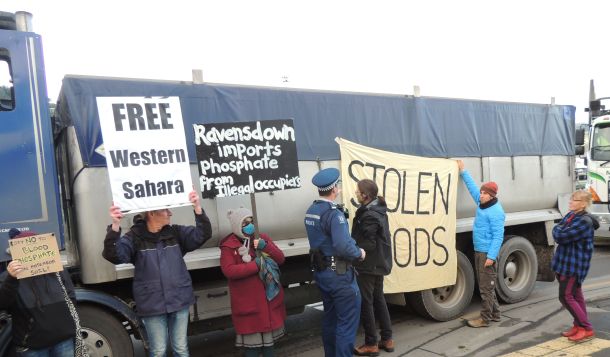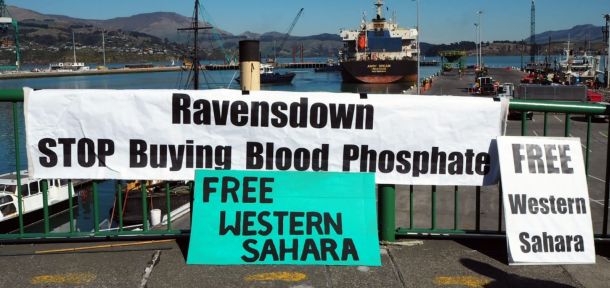14 March 2019
Brussels, Belgium
To the attention of Mr Greg S. Campbell
Chief Executive Officer of Ravensdown Ltd
Re. Ravensdown Ltd’s 2018 imports of phosphate rock from Western Sahara
Dear Mr Campbell,
Another calendar year completed, another chance to present you with our compliments and ask Ravensdown Ltd about its imports from Western Sahara during that year.
In good annual tradition, WSRW will publish its yearly “P for Plunder” report in the coming weeks, documenting the phosphate trade from Western Sahara during the previous calendar year. Regrettably, Ravensdown will once again be featured in that report. As such, we would be grateful for your answers and comments to the questions included below.
According to our calculations, an estimated 215,500 tonnes of phosphate rock from Western Sahara was purchased by Ravensdown in 2018, worth approximately US$ 18.3 million. That is twice the amount of 2017. For 2018, it would appear that Ravensdown is one of the handful of remaining importers of the contentious phosphate rock from the last colony in Africa.
As we have repeatedly submitted to Ravensdown, the imports have never taken place in accordance with the wishes of the people of Western Sahara, and thus did not respect their right to self-determination which applies to their homeland’s resources. Instead, Ravensdown’s continued purchase has provided the Moroccan government with income in the territory it holds under occupation.
It has become clear that Ravensdown chooses to ignore these concerns.
In February 2018, the South African High Court ruled that the Saharawi Arab Democratic Republic is the owner of the whole cargo of phosphate rock aboard the NM Cherry Blossom, and that the ownership of the phosphate had never been lawfully vested with OCP and/or Phosboucraa, which was not entitled to sell the phosphate. The judgment was rooted in international law, and echoes the opinion of the International Court of Justice and several Judgments by the Court of Justice of the European Union – all unequivocally concluding that Morocco has no claim to Western Sahara.
We note that the ruling made little impression on Ravensdown: it continues to import as before, but now avoids South Africa on the conflict minerals’ route to New Zealand.
Statements in New Zealand media make it clear that the company is aware of the Western Sahara conflict, yet does not sense any accountability and rather defers all responsibility onto the UN. As supply chain manager Mike Whitty stated: “We're going by what the UN are trying to achieve and what they've stipulated... We've looked at what the UN are doing very closely. It's something we're very aware of. There's clearly political issues there between different parties, and it's certainly not something we'd enter into it”. But that is precisely what Ravensdown has done: it undermines the UN’s peace efforts by backing up one party to the conflict, the aggressor nonetheless, while demonstrating complete disregard to the other party, the one with an actual legal right to the land harbouring the phosphate reserves. The UN has not appointed an administering power for Western Sahara. Yet Ravensdown ignores that element completely when doing business in the territory with a state company from Morocco – which has no mandate whatsoever with regard to Western Sahara.
And while it is understandable that a company may have a specific need for a certain type of phosphate rock, we’d wish to point out that this argument was used by literally all importing companies that have since ended their involvement in the trade of the contentious mineral, and have either sought other sources or have restructured their production process so as to diminish the dependency on the conflictual rock.
We understand Ravensdown has conceded the over-usage of nitrogen in fertilizers, and hope the company will also consider the importance of reducing cadmium-levels. We assume Ravensdown has taken note of the EU’s decision of November 2018 to cap cadmium levels in fertilizers at 60mg/kg. European decision-makers, which are at odds with Russia over geopolitical interests in Ukraine, were able to put that aside in the spirit of public health. Phosphate and derivates thereof from Morocco and Western Sahara have a much higher cadmium content, and will thus no longer be welcome on the EU market, to the benefit of producers in Russia, Norway and South Africa.
We’d be grateful if you could respond to the following questions:
1. Can you confirm that Ravensdown has purchased 215,500 tonnes of phosphate rock from Western Sahara during the year 2018?
2. What has your company done to obtain the express consent of the people of Western Sahara to the imports of phosphate rock from their country?
3. How does Ravensdown explain its imminent position as one of only remaining importers of the commodity?
4. Has Ravensdown communicated the high levels of carcinogenic elements in the imported rock to the end-users?
5. In a meeting with your company on 30 November 2018, the New Zealand Minister for Trade and Export Growth asked you to actively seek alternative sources of phosphate. What has your company done in that regard?
We think it is in your interest to review your company’s purchases from Western Sahara and halt all further imports. It is astounding to observe that the trade in Western Sahara phosphate rock is evolving into a situation where the main responsible for providing Morocco with income of its continued and illegal occupation of part of its neighbouring country, are not stock-registered companies but rather New Zealand based farmer cooperatives, such as Ravensdown. We sincerely hope you will reconsider.
Best regards,
Sara Eyckmans
Coordinator
Western Sahara Resource Watch
coordinator@wsrw.org
A copy of this letter was sent to:
- Prime Minister of New Zealand, Ms Jacinda Ardern
- UN Special Representative for Western Sahara and Head of UN Mission for the Referendum in Western Sahara, Mr Colin Stewart
- Personal Envoy of the UN Secretary General for Western Sahara, Mr Horst Köhler
These are the clients of Morocco’s phosphate plunder
For the eleventh year in a row, Western Sahara Resource Watch publishes a detailed, annual overview of the companies involved in the purchase of conflict phosphates from occupied Western Sahara.
Protesters set up roadblock to stop conflict minerals in New Zealand
The pressure is mounting on the New Zealand importers of phosphate rock from occupied Western Sahara. Today protesters in Christchurch erected roadblocks to stop trucks from transporting the conflict minerals into the local Ravensdown fertiliser factory.
Kiwi importers ignore government advice on Western Sahara
While other companies internationally have managed to find alternative sources of phosphate - and in spite of a request of the New Zealand government that they do the same - the Kiwi fertilizer industry seems unwilling to drop its imports from occupied Western Sahara.
Flotilla targets phosphate plunder ship
A Japanese-Canadian vessel that transported conflict phosphate from occupied Western Sahara was yesterday received by a floating protest in New Zealand.


